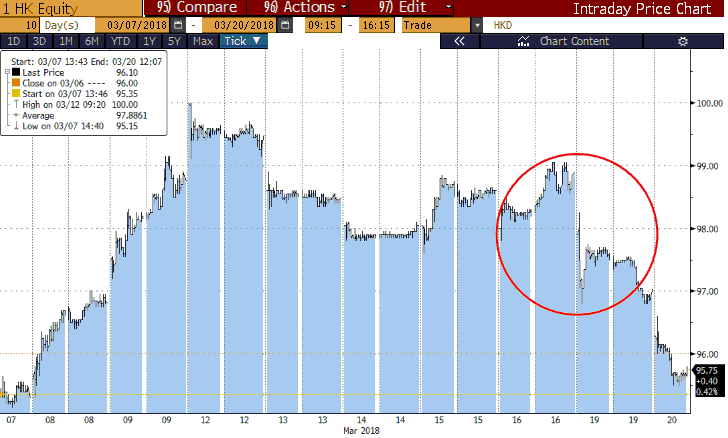Contrary To Popular Belief
“As they say in poker, ‘If you’ve been in the game 30 minutes and you don’t know who the patsy is, you’re the patsy.’” – Warren Buffett
Several weeks ago CK Hutchison holdings (1.HK) reported their earnings here in Hong Kong. Cheung Kong (CK) is one of the bellwethers of the Hong Kong stock market. It is the 10th largest company listed on the Heng Seng Index but the company’s history and clout go far beyond that.
The company was originally listed back in the 70s as a property development company, led by Sir Li Ka-shing (yes he’s been knighted) who not only is one of the richest men in the world (#1 richest in Hong Kong), but also one of the most influential and well respected. People here called him by the nickname of “Superman” and he’s earned the same sort of status that Warren Buffett has in the States — a wise businessman who lives a modest lifestyle and a generous philanthropist.
The real reason most people adore him is because he is more or less self made. Akin to the American Dream, Superman is a true Asian success story. Born as the son of a school teacher in China, he made his way down to Hong Kong and started a plastic flower manufacturing company, purchasing factory buildings along the way with his own savings which over the years appreciated in value, making him a tidy sum of money.
The Cheung Kong group’s earnings announcement is a highly publicized event that is broadcast widely on Hong Kong public television. Most people love tuning in to see what he will say about the ever soaring Hong Kong property market and there no doubt that his words alone carry enough weight to move stock prices there after.
In the last 3 years, Li Ka-shing has done a significant amount of restructuring of the business, separating out the property line from the telecommunications business and infrastructure lines. As is the case with most large conglomerates, much of the restructuring was done as part of a succession plan for when the patriarch decides to finally retire (which in HK is usually not for a long long time).
On this particular earnings announcement, most of the market seemed to be focused on what the “upside surprise” would be that Superman would deliver. Conglomerates usually trade on a discount to net asset value and part of the reason is the view that a collective group setup is more of a drag on financial performance than a benefit. Because of the potential for a spin off or divestiture (which would allow further value to be unlocked) investors were eager to bid up the stock ahead of earnings.
But on this particular occasion, which just so happened to be Friday afternoon after the market closed, Superman had a different type of surprise in mind for investors. After tirelessly working for the past 70 years, Li Ka-shing announced his retirement at the ripe old age of 89.
Woops. Not quite the upside surprise that people were thinking of. Investors now had the next 64 hours to think long and hard about the ramifications of his retirement before the market opened on Monday morning. Yet, as complicated and difficult it is to value large conglomerates, the answer was immediately crystal clear to everyone — who would want to own Cheung Kong without Superman at the helm?
Monday morning the nightmare became a reality and the stock gapped down on the “negative surprise.”

Source: Bloomberg
Last week I wrote about risk and how as investors we must re-prioritize the way we frame our investment process. We must always consider “what could go wrong” first before we consider “how much we’ll make” on any given trade.
This requires a great deal of analytical thinking and at some point during this constant review of assumptions and analysis, the contrarian mind steps in. After all, when investors flock to a herd and everyone agrees on the same thing, it is only the contrarian that ends up with an opportunity for an asymmetric reward if positioned properly.
But being a contrarian is a double edged sword. Investors must walk that fine line which separates genius from insanity and more often times than not, then don’t end up looking like geniuses.
Consider for example the single greatest risk according to most investors at this point in the markets, which is rising interest rates. It is nearly a consensus view that interest rates will rise between 3-4 times this year and the pace over the next few years will be gradual and measured.
Now, consider what would happen if the Fed decided that the economy was too robust, inflation was heating up and rates should increase faster than that?
I shudder to think about the fall out of such scenario but when all the experts and pundits agree on something, usually the market has a way of humbling everyone on the bandwagon.
On the flip side this scenario is one where the “everything bubble” continues indefinitely. This is exactly what happened for most of 2017 after the initial shock of Trump’s Presidency caused a knee jerk sell off in the markets. The rest of the year was a smooth melt up and if you were not in the markets at all (paranoid about what could go wrong) then you would have missed out on a whole lot of performance by now.
The true challenge in investing lies in assigning the appropriate probabilities to these potential risks (positive or negative) and then adjusting your risk positioning accordingly. It’s not easy to do but it’s what separates great investors from the rest of the speculators. If there one thing to remember, it’s that errors of commission cost real money where as errors of omission cost nothing. Let’s remember to figure out what could go wrong first before picking out the color of your next lambo.

